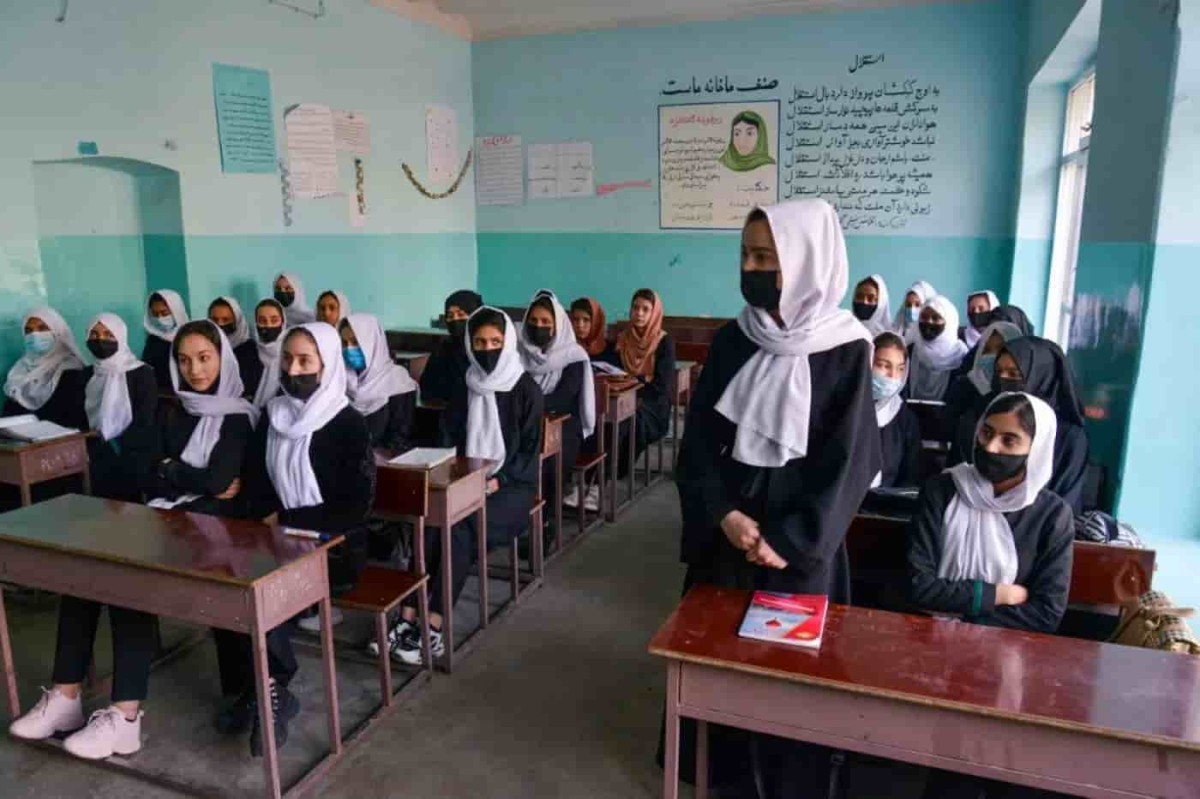 333
333
As described in the previous section, the Taliban quickly backedtracked on their promises and prohibited girls from attending school beyond sixth grade. Women and girls protested in Kabul and other cities, and the armed forces attacked and suppressed them. There are 1,880 girls' secondary schools in Afghanistan, but only one is open in limited provinces. Increasing levels of conflict, severe droughts, and successive economic shocks have placed Afghan girls and women at risk. After the Taliban took over Afghanistan, these issues are more concerning to women than early marriage or child labor.
Afghan girls’ education
Girls’ protest against the ban on Afghan girls’ education
The completely opposite reactions of some Taliban leaders regarding the closing of girls’ schools and banning Afghan girls’ education is ambiguous. There were visible cracks in the Taliban’s ranks at the time, and many Taliban officials were surprised by the shock announcement in March of indefinite closures of 3 million girls’ public secondary schools. Taliban leaders fear that a lack of educational policy changes will lead to their government’s destruction. Taliban officials continue to assure the media and diplomats that they are working on reopening schools. It is clear to many Taliban that if Afghanistan’s development is not strengthened, it will always be vulnerable to foreign intervention, so both groups must be educated. There will be a decline in a society where half the people are not educated and deprived of education.
The Taliban’s ambiguous policy towards Afghan girls’ education
Primary and university schools are largely open to women and girls, but high schools are off limits to them, illustrating that internal Taliban conflicts have contributed to this policy. In some provinces, such as Kabul and Herat, local councils have allowed public high schools to remain open despite this policy being implemented inconsistently. The Taliban have been trying to change the Afghan education system since regaining power. Nada Mohammad Nadim, an extremist leader of the Taliban, has been appointed acting minister of higher education since October.
After the US-led invasion of Afghanistan in 2001 and the overthrow of the first Taliban regime in Afghanistan, Nadeem, a former governor and military commander, has vowed to eradicate all forms of modern secular education. Further, he called women’s and girls’ education un-Islamic and contrary to Afghan values. According to him, Taliban officials based in Kandahar oppose women’s inalienable rights under false pretenses. Her comments sparked controversy and fueled speculation that the Taliban plans to further restrict Afghan girls’ education.
Taliban extremist leaders’ claims that education of Afghan girls is un-Islamic appear more illogical when there are verses and hadiths about the importance of education in which women are specifically mentioned. It is a duty of all Muslims to seek knowledge, according to the beloved Messenger of Islam. What is a more reliable source than a hadith of the beloved Prophet of Islam for a government that claims to be Islamic? “Acquiring knowledge is mandatory for every Muslim.” The Taliban have also promised to revise the national curriculum and to establish a network of schools or seminaries throughout the country’s 34 provinces. The main question is: Are Afghan girls and educated girls a threat to the Taliban regime?
The consequences of closing girls’ schools and banning Afghan girls’ education
According to a UNICEF analysis published in August 2022, keeping girls out of secondary education for Afghanistan would result in a 2.5% drop in annual GDP. As UNICEF points out, girls and women will contribute at least 5.4 billion dollars to the Afghan economy if they complete secondary education and participate in the labor market. To this analysis, UNICEF can add the positive consequences of allowing Afghan girls to study. Reduction of depression among Afghan girls, reduction of child marriage, better access to gynecologists for women, reduction of infant and maternal mortality during childbirth, etc. By closing schools, future generations of Afghans will be raised by uneducated or poor educated mothers. As a result of mothers who do not deliver capable children to the society, a deep divide will emerge in Afghanistan where half of the population will not be familiar with science and knowledge. A gap that will lead to further backwardness of the Afghan society.
The solution to Afghan girls’ education crisis
Clearly, the international dialogue with the Taliban to lift the closure of girls’ schools should continue. In spite of the economic crisis in Afghanistan, international donors should continue to pay the salaries of government teachers unconditionally, so the Taliban do not have any economic excuses for not funding education. An international conference on Afghan women’s education was recently held in Bali under the joint chairmanship of Indonesia and Qatar. Representatives from 38 countries, international organizations, non-governmental organizations and academics were present in this meeting. Participants emphasized the importance of supporting women’s education in Afghanistan and finding a comprehensive solution to the problems Afghan women are dealing with.
Support and dialogue alone are not enough. The future of Afghan government institutions is at stake, not just the Taliban regime. As soon as possible, a serious dialogue should be started with Afghan experts on re-establishing a national accountability mechanism. All parties will be committed to transparency and impartiality if this trust is created. Every day that passes without action on the education of Afghan girls will deprive them of their right to access the most important services to determine their destiny. The Taliban and the international community must act quickly to solve the problem of Afghan girls’ education so that the country can return to the difficult path of creating a just and inclusive peace. Even many Taliban leaders are aware of the importance of this issue. It is a general demand of society that girls be educated and employed. Governments must respond positively to society’s demands. Afghan society with educated girls and mothers will guarantee the future of Afghanistan.
Comment
Post a comment for this article